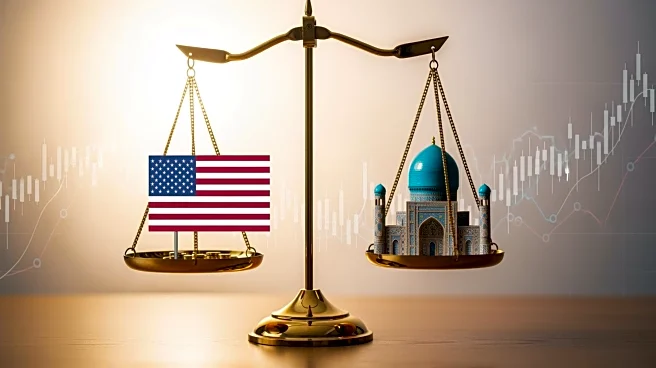What's Happening?
President Donald Trump has announced a significant trade deal with Uzbekistan, which is expected to generate over $100 billion in U.S. exports and Uzbek investment over the next decade. The announcement followed a meeting between Trump and Uzbek President Shavkat
Mirziyoyev, along with leaders from four other Central Asian countries. This deal is part of a broader U.S. strategy to diversify sources of raw materials, particularly rare earth elements, amid supply restrictions from China. The agreement highlights increased U.S. engagement in Central Asia, a region traditionally influenced by Russia and increasingly by China. The deal includes investments in various American sectors such as critical minerals, aviation, automotive parts, infrastructure, agriculture, energy, chemicals, and information technology.
Why It's Important?
The trade deal with Uzbekistan marks a strategic move by the United States to secure critical minerals and diversify its supply chains, reducing dependency on China. This is particularly significant given the geopolitical tensions and trade restrictions imposed by China, the world's primary supplier of rare earth elements. The agreement could bolster U.S. economic security and strengthen ties with Central Asia, a region rich in mineral resources. It also represents a shift in U.S. foreign policy, aiming to counterbalance Russian and Chinese influence in the region. The deal could lead to increased economic opportunities for American industries involved in the sectors mentioned, potentially boosting job creation and technological advancements.
What's Next?
President Trump has indicated that the United States will secure essential rare earths within 18 months through an emergency program. Additionally, Secretary of State Marco Rubio plans to visit the five Central Asian countries in the coming year, which could further solidify diplomatic and economic relations. The ongoing engagement with Central Asia may lead to more collaborative efforts in exploring and developing mineral resources, enhancing U.S. strategic interests in the region. The success of this trade deal could pave the way for similar agreements with other countries, further diversifying U.S. supply chains and strengthening its global economic position.
Beyond the Headlines
The trade deal with Uzbekistan could have long-term implications for global trade dynamics, particularly in the context of rare earth elements. As the U.S. seeks to reduce its reliance on China, this agreement may encourage other countries to explore alternative sources for critical minerals. It also raises questions about the balance of power in Central Asia, as the U.S. increases its presence in a region historically dominated by Russia. The deal may influence future geopolitical alignments and economic partnerships, potentially reshaping the landscape of international trade and diplomacy.















